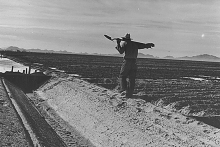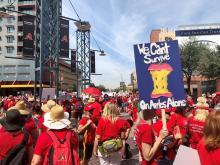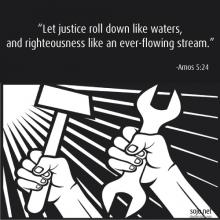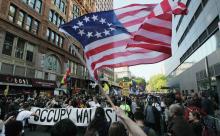May Day

Through the years, we’ve written about the ways churches can help workers — and the way workers can help the church.

ON MAY 1, tens of millions of people across the globe celebrate International Workers’ Day, often called May Day or International Labor Day. Countries around the world have made May Day a major holiday, but its origin as a day to fight for and honor the rights of workers has strong roots in the United States and the struggle for the eight-hour workday. During the Great Depression, Dorothy Day and Peter Maurin chose May Day 1933 to launch the first issue of The Catholic Worker, a newspaper dedicated to the proposition that it is “possible to be radical and not atheist”—an idea that has also been central to Sojourners these past 50 years. In fact, a radical commitment to labor rights and economic justice is because of our faith, not in spite of it.
The dedication and sacrifice of labor activists has led to hard-won rights—including the eight-hour workday, the weekend, safe working conditions, an end to most child labor, and more—rights far too many of us can take for granted. And yet standing up for the dignity and rights of workers remains incredibly important because these rights are not enjoyed by everyone equally and have been relentlessly eroded over the past four decades. The struggle for labor rights has shifted amid an evolution in the nature of work, with many workers exercising greater agency in the COVID-19 pandemic, leaving behind jobs that are often underpaid, unsafe, or underappreciated.

It has been called the "Teachers' Spring" in the United States, with educators from five states staging an unprecedented wave of protests demanding increases in pay and school budgets.
1. Officers Charged in Freddie Gray's Death, Ruled a Homicide
“In an unexpected announcement Friday, Baltimore lead prosecutor Marilyn J. Mosby said there is “probable cause” to file criminal charges against police officers in the death of Freddie Gray ...”
2. How Biased Is Your Feed?
Via Future Journalism Project Media Lab: A new study indicates that news and information gets more biased as it passes through social networks. … And given that half of Facebook and Twitter users consume news via those networks, our consumption and digestion of such “news” could take on that bias.
3. Nepal Earthquake: Up to 15,000 May Have Died, According to Army Chief
Amid public anger at government response to the massive earthquake and threats of disease, the country’s army chief painted a grim estimate of between 10-15,000 likely deaths in the wake of the weekend’s quake.
4. Lawmaker Considers Blocking Baltimore Protesters’ Food Stamp Benefits
“‘That’s an idea, and that could be legislation,’ [Maryland state legislator Patrick McDonough] said in response to a caller who asked if benefits could be revoked from parents of protesters. ‘I think that you could make the case that there is a failure to do proper parenting, and allowing this stuff to happen—is there an opportunity for a month to take away your food stamps?’”
May Day rallies are planned across the country urging Congress to ease the nation's immigration laws. Although the rallies won't be as large as demonstrations in 2006 and 2007, groups have focused heavily on calling and writing congressional representatives. Activists feel more their ongoing targeted campaigns at congresional representatives and demonstrations are the most effective way to achieve immigration reform. The Associated Press reports:
A phone blitz targeting Republican U.S. Sen. Orrin Hatch produced 100 calls a day to the Utah lawmaker's office last week, said Jeff Parcher, communications director for the Center for Community Change, which works on technology-driven advocacy for the network of groups. After Hatch was quoted Sunday in The Salt Lake Tribune saying immigration reform couldn't wait, a message went out to call his office with thanks.
Read more here.

Editor's Note: The following is the text of an invocation being given at the May Day Rally in Madison, Wis.
When we gather at a place like our State Capitol, there are people here from all sorts of religious and non-religious backgrounds.
There are Christians and Jews, Muslims and Buddhists, Hindus and and Bahai, Humanists and people who are pretty sure they believe something, but don’t know exactly how the heck to describe it.
What connects us all this day is a spirit of hospitality, a spirit of compassion and a spirit of justice.
At their worst, religious and other beliefs can isolate us in little camps where we see outsiders as threats. At their best, they call us to hospitality, not only to those we know, but to the strangers in our midst – those who come from other places, speak other languages, seek a new life. At their best, they call us to embrace those who seek to be part of our community.

As I walked around Union Square in NYC yesterday between 4 and 5:30, waiting for the march down Broadway to begin, memories of occupied Zuccotti Park came to mind. Handmade signs about a very wide range of issues were everywhere. There were drumming and musical groups doing their rhythmic things and people dancing as they did so. There was Reverend Billy performing, and an incredibly well done colored chalk piece of artwork on the sidewalk near 17th and Broadway. People everywhere, mainly white folks but diverse, lots of young people but with a significant number of non-young people.
And a spirit of hope, a spirit which declared: “we are here, we are organized, we have not been defeated and we are not going away.”
A playlist for the working class: Ten songs in honor of May Day and workers everywhere.
John Lennon, "Working Class Hero"
This song from John Lennon's first post-Beatles solo album, 1970's John Lennon/Plastic Ono Band, is about working class folks being "processed" into the middle class or the "machine," according to what Lennon told Rolling Stone magazine in an interview the same year the album released. "A working class hero is something to be," is the song's mantra and refrain.